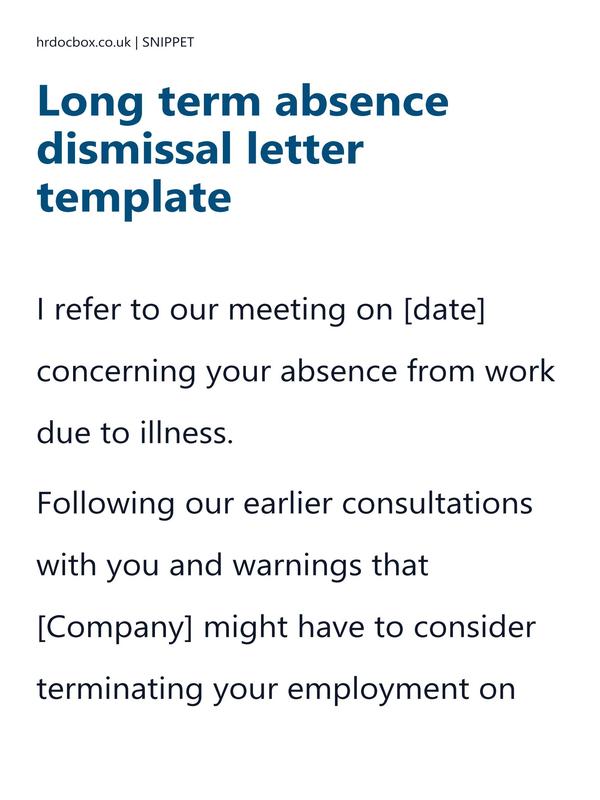Long term absence dismissal letter template


If an employee is unable to return to their job as a result of long-term absence and there are no suitable alternatives, send this model letter to confirm dismissal.
- Includes 12 months' access to the Long term absence dismissal letter template, with all updates provided free of charge and notified to you.
- UK-specific accuracy.
- 383 words over 2 pages.
- Last updated 11/02/2026.
- Format: Word / plain text / email.
- Delivery: Instant download after purchase (no physical item).
- Access: Download link shown here after checkout.
- This Long term absence dismissal letter template will SAVE you up to 1 hour drafting & research, save you money, and reduce your risk.
[Sender name]
[Sender address]
[date]
[Recipient name]
[Recipient address]
Dear [Recipient first name],
Termination of employment
I refer to our meeting on [date] concerning your absence from work due to illness.
Following our earlier consultations with you and warnings that [Company] might have to consider terminating your employment on the grounds of your long-term absence from work since [date], you attended, at our request, a consultation with [name of doctor].
[Name of doctor] [advised that it would be inadvisable for you to return to your current employment.] OR [recommended that [details of recommendations] would be necessary to enable your return to work. We consider these recommendations and discussed them with you, however have decided that they are not viable [give reasons].]
We held a meeting with you on [date] during
This is a 30% preview of the Long term absence dismissal letter template. For instant full access, purchase this item or a parent bundle.
Long term absence dismissal letter template purpose
A long-term absence dismissal letter is a formal communication from an employer to an employee who has been absent from work for an extended period, usually due to illness or injury. The letter typically informs the employee that their employment will be terminated due to their prolonged absence.
The letter should state the reasons for the dismissal, including the length of the absence and the employer's efforts to support the employee during this time. The letter should also inform the employee of their rights to appeal the decision and any entitlements they may have under their employment contract, such as notice pay or redundancy pay.
It is important for employers to handle long-term absence dismissals sensitively and fairly, following all relevant employment laws and regulations. Employers should also provide appropriate support to employees who are absent due to illness or injury, including access to occupational health services and reasonable adjustments to enable a return to work where possible.
Practical application of a Long term absence dismissal letter template
- The Long term absence dismissal letter template should be actioned / delivered as soon as reasonably practical.
- It is sent / delivered by an employer / HR team to an employee.
Compliance
Compliance
This Long term absence dismissal letter template incorporates relevant UK laws and HR standards, including those listed below:
-
The Equality Act 2010: Employers must not discriminate against employees due to their disability or health condition. This means they should make reasonable adjustments to support a disabled employee's return to work, including adjusting working hours or duties.
-
The Employment Rights Act 1996: This act outlines the minimum notice periods that employers must give to employees before dismissing them. The notice periods depend on the length of service of the employee and range from one week to 12 weeks.
-
The Statutory Sick Pay (SSP) Regulations 2018: These regulations state that employers must pay SSP to employees who are absent from work due to illness or injury, subject to certain eligibility criteria. Employees are entitled to SSP for up to 28 weeks.
-
The ACAS Code of Practice on Disciplinary and Grievance Procedures: This code provides guidance for employers on how to handle disciplinary and dismissal processes fairly and consistently. Employers should follow this code when dismissing employees due to long-term absence.
-
The Data Protection Act 2018: Employers must ensure that any personal data they collect and process about an employee's health or disability is done in compliance with this act, including obtaining the employee's consent and ensuring that the data is kept confidential.
Long term absence dismissal workflow
Long term absence dismissal workflow
Check which resources should be implemeted before and/or after the Long term absence dismissal letter template, to understand the workflow.
Long term sick absence review meeting script
Our Long Term Sick Absence Review Meeting Script ensures structured discussions to address employee health concerns and plan effective support strategies.
Dismissal appeal letter
Our dismissal appeal letter template can help you formally challenge your dismissal.
Practical example
Practical example
Instantly unlock with a purchase.
Instantly unlock with a purchase.
Scenario: Long-Term Absence Dismissal
ABC Limited, a UK-based company, faces the challenging situation of an employee, Sarah, who has been on long-term sickness absence due to a serious medical condition. HR Manager Emma oversees the process of considering dismissal due to prolonged absence, ensuring that it is handled with sensitivity and in compliance with legal requirements.
Identification of Long-Term Absence
Sarah has been on long-term sickness absence for several months due to a medical condition that is preventing her from returning to work. Despite receiving medical treatment and accommodations from the Company, Sarah's condition has not improved, and there is uncertainty about her ability to resume work in the foreseeable future.
Medical Assessment and Consultation
Emma arranges for an independent medical assessment to evaluate Sarah's medical condition, prognosis, and likelihood of returning to work within a reasonable timeframe. She also consults with Sarah's treating healthcare professionals to gather additional information and insights into her condition.
Review of Absence Management Processs
Emma reviews the company's absence management policy and procedures to ensure that all necessary steps have been taken to support Sarah during her absence. This includes providing reasonable adjustments, offering rehabilitation support, and maintaining regular communication with Sarah to keep her informed of her rights and responsibilities.
Consideration of Alternatives
Before proceeding with dismissal, Emma explores alternatives to termination, such as offering alternative employment or adjusting Sarah's working arrangements to accommodate her medical condition. She considers the feasibility of these options in consultation with Sarah and relevant stakeholders.
Legal Obligations and Fair Process
Emma ensures that the decision to dismiss Sarah is made in compliance with legal requirements, including adherence to the Equality Act 2010 and the company's disciplinary and dismissal procedures. She conducts a thorough review of the evidence and documentation related to Sarah's case to demonstrate that the decision is fair, reasonable, and justified.
Dismissal Decision
After careful consideration and consultation, Emma concludes that dismissal is the only viable option due to the prolonged nature of Sarah's absence and the uncertainty surrounding her ability to return to work. She communicates the decision to Sarah in a compassionate and empathetic manner, offering support and guidance throughout the process.
Support and Assistance
Emma provides Sarah with information about her rights and entitlements upon dismissal, including any severance pay, benefits, or support services available to her. She also offers assistance with accessing additional support, such as occupational health services or career transition resources, to help Sarah navigate the transition effectively.
Frequently Asked Questions about a Long term absence dismissal letter template
Frequently Asked Questions about a Long term absence dismissal letter template
-
Can I use the Long term absence dismissal letter template in my small business?
Yes. The Long term absence dismissal letter template is designed to be flexible and suitable for organisations of all sizes, including small businesses and charities. It follows UK employment law best practice, so even if you don't have an in-house HR team, you can confidently apply it.
-
Is the Long term absence dismissal letter template compliant with 2026 UK employment law?
Absolutely. Like the Long term absence dismissal letter template, all of our templates are drafted with the latest ACAS guidance and UK employment legislation in mind. We review and update them regularly, so you can be confident they remain compliant.
-
Can I customise the Long term absence dismissal letter template for my organisation?
Yes, we highlight the areas of the Long term absence dismissal letter template that you need to update with your own details, and where you need to make decisions to suit your situation. This saves you time and ensures that you meet best practice.
-
Do I get instant access to the Long term absence dismissal letter template?
Yes. Once purchased, you'll be able to download the Long term absence dismissal letter template instantly. Templates are provided in editable Word or Excel format so you can customise them easily, and in PDF format for easy sharing.
-
What if I need more help, not just a Long term absence dismissal letter template?
If you're looking for broader support, we also offer toolkits and library bundles that include the Long term absence dismissal letter template, along with other HR templates and policies for fully managing your situation. These may be more cost-effective if you need deeper advice.
-
Why should I use this Long term absence dismissal letter template, and not AI to generate it?
The risk of using a free AI-generated template 'without review' includes your legal exposure, missing context, and no awareness of the wider process, whereas purchasing the Long term absence dismissal letter template from us mitigates that risk.
